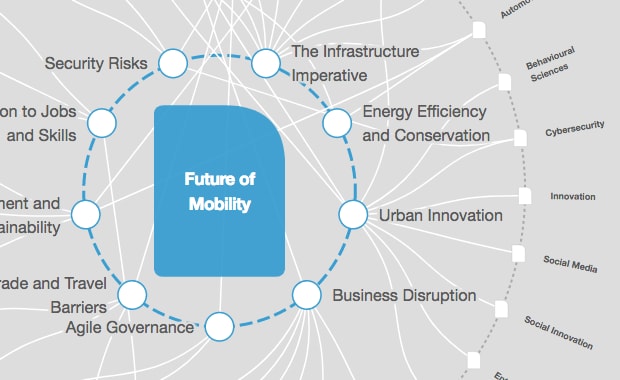Cars still dominate the American commute

More than two thirds of American commuters use their own car to move between home and work, a new survey finds. Image: Unsplash/ Alexander Popov

Explore and monitor how Mobility is affecting economies, industries and global issues

Get involved with our crowdsourced digital platform to deliver impact at scale
Stay up to date:
Mobility
- The detrimental effects of carbon emissions produced as a result of commuting is well documented.
- Countries such as Germany and the Netherlands have made a conscious effort to move away from motor vehicles to more sustainable modes of transport.
- More than two thirds of Americans, however, still opt to use their own cars to get to work rather than public transport options.
In many European cities, investments in bike infrastructure and public transportation systems have been successful in enticing commuters to ditch their cars in favor of buses, trains or bicycles. In Germany for example, 23 percent of commuters take the bike to get to work, school or university and another 26 percent use public transportation. Meanwhile, 65 percent take their own car, which still sounds like a lot but is considerably lower than it is in the United States. In the Netherlands, arguably the country most famous for its love of bicycles, 36 percent of commuters take their bike to work while 56 percent opt for their car instead.
American commute: dominated by cars
Americans still largely rely on their car to get to work and back. According to Statista’s Global Consumer Survey, 76 percent of American commuters use their own car to move between home and work, making it by far the most popular mode of transportation. Meanwhile, only 11 percent of the 5,649 respondents use public transportation while 10 percent ride their bike. As our chart shows, alternatives to the car have become more popular since 2019, but none comes close to challenging the car's status as the king of the American commute.
There are several factors contributing to the low adoption of bicycles as a means of everyday transportation: for one, Americans are used to commuting longer distances than people in most European nations, automatically ruling out the bike for many. And secondly, many major cities in the U.S. aren’t exactly bike-friendly. According to a recent study, just three American cities made it into the 50 most bicycle-friendly cities in the world, when taking into account factors such as bicycle infrastructure, safety and usage as well as things as mundane as the weather.
What's the World Economic Forum doing about the transition to clean energy?
Don't miss any update on this topic
Create a free account and access your personalized content collection with our latest publications and analyses.
License and Republishing
World Economic Forum articles may be republished in accordance with the Creative Commons Attribution-NonCommercial-NoDerivatives 4.0 International Public License, and in accordance with our Terms of Use.
The views expressed in this article are those of the author alone and not the World Economic Forum.
The Agenda Weekly
A weekly update of the most important issues driving the global agenda
You can unsubscribe at any time using the link in our emails. For more details, review our privacy policy.
More on Industries in DepthSee all
Abhay Pareek and Drishti Kumar
April 23, 2024
Charlotte Edmond
April 11, 2024
Victoria Masterson
April 5, 2024
Douglas Broom
April 3, 2024
Naoko Tochibayashi and Naoko Kutty
March 28, 2024







